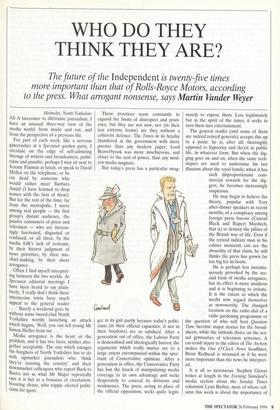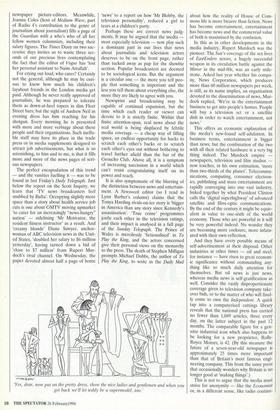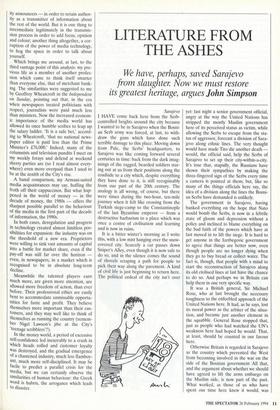WHO DO THEY THINK THEY ARE?
The future of the Independent is twenty-five times
more important than that of Rolls-Royce Motors, according
to the press. What arrogant nonsense, says Martin Vander Weyer Helmsley, North Yorkshire AS A latecomer to dilettante journalism, I have an unusual three-way view of the media world: from inside and out, and from the perspective of a previous life.
For part of each week, like a nervous
gatecrasher at a Spectator garden party, I circulate on the edge of self-admiring throngs of writers and broadcasters, politi- cians and pundits: perhaps I may sit next to Jeremy Paxman at lunch, or speak to David Mellor on the telephone, or be cut dead by someone who would rather meet Barbara Amid, (I have learned to drop names with the best of them). But for the rest of the time, far from the metropolis, I move among real people — the first group's distant audience, the passive consumers of press and television — who are increas- ingly fascinated, disgusted or confused, or all three, by the media folk's lack of restraint, by their bizarre judgment of news priorities, by their mis- chief-making, by their sheer arrogance.
Often I find myself interpret-
ing between the two worlds. At Spectator editorial meetings I have been heard to say plain- tively, 'I really don't think these Internecine trivia have much appeal to the general reader
• . Barely a weekend goes by Without some tweed-clad North Yorkshire worthy launching an attack Which begins, 'Well, you can tell young Mr Simon Heffer from me.
Media arrogance is the heart of the problem, and it has two faces, neither alto- gether acceptable. The one which enrages the burghers of North Yorkshire has to do With upmarket journalists who 'think they're running the country' and their downmarket colleagues who report Back to Basics not as what Mr Major repeatedly says it is but as a bonanza of circulation- boosting sleaze, who topple elected politi- cians for sport.
These practices seem constantly to expand the limits of disrespect and pruri- ence, but they are not new, nor (in their less extreme forms) are they without a coherent defence. The Times in its heyday thundered at the government with more gravitas than any modern paper; Lord Beaverbrook was more mischievous, and closer to the seat of power, than any mod- ern media magnate.
But today's press has a particular swag- ger in its gait partly because today's politi- cians (in their official capacities, if not in their boudoirs) are so subdued. After a generation out of office, the Labour Party is demoralised and ideologically barren; the arguments which really matter are to a large extent encompassed within the spec- trum of Conservative opinions. After a generation in office, the Conservative Party has lost the knack of manipulating media coverage to its own advantage and seeks desperately to conceal its divisions and weaknesses. The press, acting in place of the official opposition, seeks quite legiti- mately to expose them. Less legitimately but in the spirit of the times, it seeks to turn them into entertainment.
The general reader (and some of them are indeed retired generals) accepts this up to a point: he is, after all, thoroughly opposed to hypocrisy and deceit in public life, in whatever form. But when the dig- ging goes on and on, when the same tech- niques are used to undermine his last illusions about the royal family, when it has such disproportionate com- mercial rewards for the dig- gers, he becomes increasingly suspicious.
He may begin to believe the theory, popular with Tory after-dinner speakers in recent months, of a conspiracy among foreign press barons (Conrad Black and Rupert Murdoch, that is) to destroy the pillars of the British way of life. Even if the retired military man in his calmer moments can see the absurdity of that claim, he still thinks the press has grown far too big for its boots.
He is perhaps less instanta- neously provoked by the sec- ond form of media arrogance, but its effect is more insidious and it is beginning to irritate. It is the extent to which the media now regard themselves as newsworthy. The changed location on the radio dial of a radio gardening programme or the question of who will host Question Time become major stories for the broad- sheets, while the tabloids thrive on the sex- ual gymnastics of television actresses. A car-crash injury to the editor of The Archers makes the One O'Clock News headlines; Brian Redhead is mourned as if he were more important than the news he interpret- ed.
It is all so incestuous. Stephen Glover writes at length in the Evening Standard's media section about the Sunday Times columnist Lynn Barber, most of whose col- umn this week is about the importance of newspaper picture-editors. Meanwhile, Joanna Coles (host of Medium Wave, part of Radio 4's contribution to the genre of journalism about journalism) fills a page of the Guardian with a who's who of all her fellow women columnists, including their salary figures. The Times Diary on two suc- cessive days invites us to waste three sec- onds of our precious lives contemplating the fact that the editor of Vogue has `lost her personal assistant to Naim Attallah'.
For crying out loud, who cares? Certainly not the general, although he may be curi- ous to know how much his children's layabout friends in the London media get paid. Although he never really approved of journalists, he was prepared to tolerate them as down-at-heel topers in dim Fleet Street bars; but the sight of Andrew Neil in evening dress has him reaching for his shotgun. Every morning he is presented with more and more verbiage about these people and their organisations. Such ineffa- ble stuff may have its place in the trade press or in media supplements designed to attract job advertisements, but what is so astonishing, to him and to me, is that it fills more and more of the news pages of seri- ous newspapers.
The perfect encapsulation of this trend — and the vanities fuelling it — was to be found in last Friday's Daily Telegraph. Just below the report on the Scott Inquiry, we learn that `TV news broadcasters feel snubbed by Bafta'. Occupying slightly more space than a story about health service job cuts is one about GMTV moving upmarket `to cater for an increasingly "news-hungry" nation' — sidelining `Mr Motivator, the resident fitness instructor' as a result. And 'creamy blonde' Diane Sawyer, anchor- woman of ABC television news in the Unit- ed States, `doubled her salary to $6 million yesterday', having turned down a bid of 'close to $7 million' from Rupert Mur- doch's rival channel. On Wednesday, the paper devoted almost half a page of home
`news' to a report on how 'Mr Blobby, the television personality', reduced a girl to tears at a children's party.
Perhaps these are correct news judg- ments. It may be argued that the media — most especially television — now play such a dominant part in our lives that news about journalists and television actors deserves to be on the front page, rather than tucked away as pap for the showbiz section. Popular broadcasters are deemed to be sociological icons. But the argument is a circular one — the more you tell peo- ple that something is important and the less you tell them about everything else, the more they are likely to agree with you.
Newsprint and broadcasting may be capable of continual expansion, but the time which each reader or viewer can devote to it is strictly finite. Within that finite attention-span, real news about the real world is being displaced by febrile media coverage — a cheap way of filling space, an endless opportunity for hacks to scratch each other's backs or to scratch each other's eyes out without bothering to travel further afield than the bar of the Groucho Club. Above all, it is a symptom of increasing narcissism in a world which can't resist congratulating itself on its power and reach.
It is also symptomatic of the blurring of the distinction between news and entertain- ment. A Newsweek editor (so I read in Lynn Barber's column) claims that the Tonya Harding rivals-on-ice story is `bigger in America than any story since Kennedy's assassination'. 'True crime' programmes jostle each other in the television ratings, and their impact is analysed in a full page of the Sunday Telegraph. The Prince of Wales is mercilessly `fictionalised' in To Play the King, and the actors concerned give their personal views on the monarchy to the press. The death of Stephen Milligan prompts Michael Dobbs, the author of To Play the King, to write in the Daily Mail
'Yes, dear, now put on the pretty dress, show the nice ladies and gentlemen and when you get back we'll let teddy be a supermodel, too.' about how the reality of House of Com- mons life is more bizarre than fiction. News has become entertainment, entertainment has become news and the commercial value of both is maximised by the confusion.
In this as in other developments in the media industry, Rupert Murdoch was the pioneer. The Sun's coverage of the sex lives of EastEnders actors, a hugely successful weapon in its circulation battle against the Mirror in the mid-80s, was an early mile- stone. Asked last year whether his compa- ny, News Corporation, which produces more than 60 million newspapers per week, is still, as its name implies, an organisation devoted to the dissemination of news, Mur- doch replied, `We're in the entertainment business to get into people's homes. People will buy a television set or a satellite dish in order to watch entertainment, not news.'
This offers an economic explanation of the media's new-found self-adulation. In business terms, entertainment is bigger than news; but the combination of the two with all their related hardware is a very big thing indeed. The Murdoch empire — newspapers, television and film studios — now touches, in his own estimation, `more than two-thirds of the planet'. Telecommu- nications, computing, consumer electron- ics, publishing and mass entertainment are rapidly converging into one vast industry, linked together by what President Clinton calls the `digital superhighway' of advanced satellite and fibre-optic communications. By the end of the century it might be equiv- alent in value to one-sixth of the world economy. Those who are powerful in it will be very powerful indeed. No wonder they are becoming more cocksure, more infatu- ated with their own reflection.
And they have every possible means of self-advertisement at their disposal. Other industries at other times — oil and steel, for instance — have risen to great econom- ic significance without commanding any- thing like so much daily attention for themselves. But oil news is just news, whereas media news is self-gratification as well. Consider the vastly disproportionate
coverage given to television company take- over bids, or to the matter of who will final- ly come to own the Independent. A quick
tap into a computerised cuttings library reveals that the national press has carried no fewer than 1,049 articles, three every day, on the latter subject in the past 12 months. The comparable figure for a gen- uine industrial icon which also happens to be looking for a new proprietor, Rolls- Royce Motors, is 42. (By this measure the future of a seven-year-old newspaper is approximately 25 times more important than that of Britain's most famous engi- neering company. This from the same press that occasionally wonders why Britain is no longer good at `making things'.)
This is not to argue that the media must strive for anonymity — like the Economist or, in a different sense, like radio continu-
ity announcers — in order to retain author- ity as a transmitter of information about the rest of the world. But it is one thing to intermediate legitimately in the transmis- sion process in order to add focus, opinion and colour; another thing altogether, a cor- ruption of the power of media technology, to hog the space in order to talk about yourself.
Which brings me around, at last, to the third vantage point of this analysis: my pre- vious life as a member of another profes- sion which came to think itself smarter than everyone else, that of merchant bank- ing. The similarities were suggested to me by Geoffrey Wheatcroft in the Independent on Sunday, pointing out that, in the era when newspapers treated politicians with respect, journalists were paid much less than ministers. Now the increased econom- ic importance of the media world has allowed its once humble scribes to leap up the salary ladder. 'It is a safe bet,' accord- ing to Wheatcroft, 'that no national news- paper editor is paid less than the Prime Minister's f76,000.' Indeed, many of the columnists and television pundits I meet on my weekly forays and defend at weekend sherry parties are (so I read almost every- where) even more overpaid than I used to be at the zenith of the City's rise.
A banal comparison, my Armani-suited media acquaintances may say, huffing the froth off their cappuccinos. But what hap- pened in the world of money — in the decade of money, the 1980s — offers the sharpest possible parallel to the behaviour of the media in the first part of the decade of information, the 1990s.
In,both cases, deregulation and progress in technology created almost limitless pos- sibilities for expansion: the industry was on the threshold of a new era. Proprietors were willing to sink vast amounts of capital into a battle for market share, even if the pay-off was still far over the horizon — even, in newspapers, in a market which is recognised to be in absolute long-term decline.
Meanwhile the talented players earn much more, are given more attention, are allowed more freedom of action, than ever before. Their professional ethics are easily bent to accommodate unmissable opportu- nities for fame and profit. They believe themselves more important than their cus- tomers, and they may well like to think of themselves as running the country (remem- ber Nigel Lawson's jibe at the City's 'teenage scribblers'?).
In the money world, a period of excessive self-confidence led inexorably to a crash in Which heads rolled and customer loyalty was destroyed, and the gradual emergence of a chastened industry, much less flamboy- ant, much more self-disciplined. It may be facile to predict a parallel crisis for the media, but we can certainly observe the similarities of human behaviour: the Greek word is hubris, the arrogance which leads to disaster.




























































 Previous page
Previous page